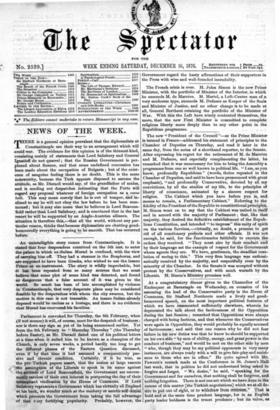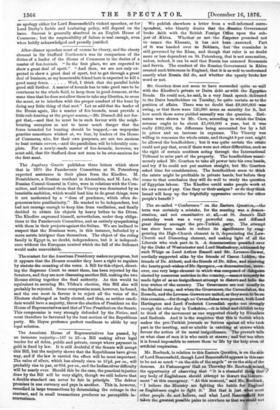At a congratulatory dinner given to the Chancellor of the
Exchequer at Barnstaple on Wednesday, on occasion of his assuming the lead of the Conservative party in the House of Commons, Sir Stafford Northcote made a lively and good- humoured speech, on the most important political features of which we have commented sufficiently elsewhere, wherein be deprecated the talk about the factiousness of the Opposition during the last Session ; remarked that Oppositions were always charged with being factious, and that whenever the Conservatives were again in Opposition, they would probably be equally accused of factiousness ; and said that one reason why he did not fear failure in his new duties was that he knew he should be supported on his own side "by men of ability, energy, and great power in the conduct of business," and would be met on the other side by men "who, though they may be my political opponents in very many instances, are always ready with a will to give fair-play and assist- ance to those who are in office." He quite agreed with Mr. Fawcett's remark made at the Conference in St. James's Hall last week, that in politics be did not understand being asked to forgive and forget. "We desire," he said, "speaking for the Government and for ourselves, that nothing shall be forgiven, and nothing forgotten. There is not one act which we have done in the course of this matter [the Turkish negotiations] which we at all de- sire to put out of sight, or to withdraw from criticism." That ia bold and at the same time prudent language, for in an English party leader boldness is the truest prudence ; but its value, as
an apology either for Lord Beaconsfield's violent speeches, or for Lord Derby's feeble and hesitating policy, will depend on the issue. Success is generally absolved in an English House of Commons ; but the responsibility of failure is real enough, even when boldly acknowledged and proudly justified.



































 Previous page
Previous page